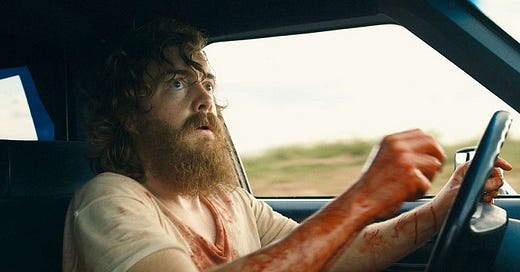Revenge movies are a cheap staple of Hollywood. They are like Flamin' Hot Cheetos: questionably enjoyable but almost certainly not good for you.
Revenge is a lazy form of audience engagement. You inflict some terrible trauma on the protagonist or at least threaten it, which gives the protagonist a green light to go on a violent rampage. You build to a climax with the final showdown where justice is delivered to the primary offender. Your audience walks out of the theater feeling satiated.
This is the pond that Liam Neeson and Jason Statham regularly swim in. But outside the exploitation realm, there are movies that address revenge in a more serious vein. One of the best is Blue Ruin.
The movie opens with a man soaking in a tub. He hears a car pull into the driveway; he leaps out the bathroom window naked and flees.
Thus we are introduced to Dwight Evans, a haunted figure who lives in his car just off a beach in Delaware. His carefully proscribed routine is interrupted when a friendly police officer informs him that the man convicted of murdering his parents, Wade Cleland, is being released from prison early. Dwight responds by getting his car started and heading out to Virginia. Along the way, he attempts to obtain a gun and it becomes clear he wants revenge.
He watches as Wade is greeted by his family outside the prison and driven away. He follows them to a bar where they celebrate Wade's release. Dwight grabs a knife and sneaks into the bathroom of the bar, where he ambushes Wade and kills him.
Afterwards, he cleans up and heads to his sister's house for a painful reunion. As they talk, Dwight realizes the Cleland family hasn't reported Wade's death to the police and are likely to be coming for her in revenge. Dwight convinces her to take her children out of town and stays behind to deal with the inevitable confrontation.
Afterwards, Dwight commits himself to extinguishing the Cleland clan, to ensure the safety of his sister. The rest of the movie is the brutal, inexorable grind to that outcome.
Blue Ruin, an independent production funded on Kickstarter, was written and directed by Jeremy Saulnier. A significant portion of the film unfolds without dialog. Saulnier is also a cinematographer, so he is able to speak to the audience through imagery. (The movie doesn't look like a $400,000 film) I can't remember a movie that handled exposition more economically. All credit to Saulnier.
Credit also should go to Macon Blair, who plays Dwight. It's not clear whether Dwight is neurodivergent or severely traumatized by the death of his parents, but he is completely alienated from normal human contact and struggles with the most basic social interactions. Saulneir's choice to cut away dialog masterfully enhances this distance between Dwight and the world. At the same time, Blair's expressive eyes mirror the pain and struggles within, building genuine emotional empathy with the audience.
That's a key point. Your average revenge movie manipulates audiences into caring about the characters, rather than doing the hard work of building real characters and taking the time to examine their lives and minds. The inciting victims - wives, children, etc. - are always presented at the beginning almost as if they are starring in a commercial for soft drinks. They are wholesome and pure, engaged in wholesome activities in a Norman Rockwell world of small town America. Then the aliens (dirty, greasy, sneering, vulgar bad guys) intrude on this paradise, bringing death and evil with them. The stalwart, sometimes reluctant, hero is set on a mission of revenge or protection, given carte blanche to use as much violence as needed to end the menace. Catharsis reigns at the end.
Blue Ruin follows this basic structure, but omits the bucolic victims. Dwight's parents are never seen, only referred to distantly as ghosts. For all we know, they may have been horrid people. There is no real understanding of Dwight's immediate reaction to move to kill Wade. Dwight begins as a cipher and we have to spend time with him to gain a better understanding of who he is. His motivation shifts to protection of his sister and nieces, which is a standard revenge movie trope, but it's his own actions that put them in danger and his sister blames him. Sure the Clelands are a family of violent redneck assholes, but they are actually playing out the revenge motif from their own perspective, fighting to stop the man who killed their brother and who now threatens them all.
Blue Ruin doesn't provide any easy answers to the question of the morality of revenge. The world is probably better off without most of the Clelands. But there is no catharsis, as a small twist undermines Dwight's journey of justice. He isn't at peace at the end, his mission was misguided, and doesn't earn a happy reunion with family.
My kind of movie.




